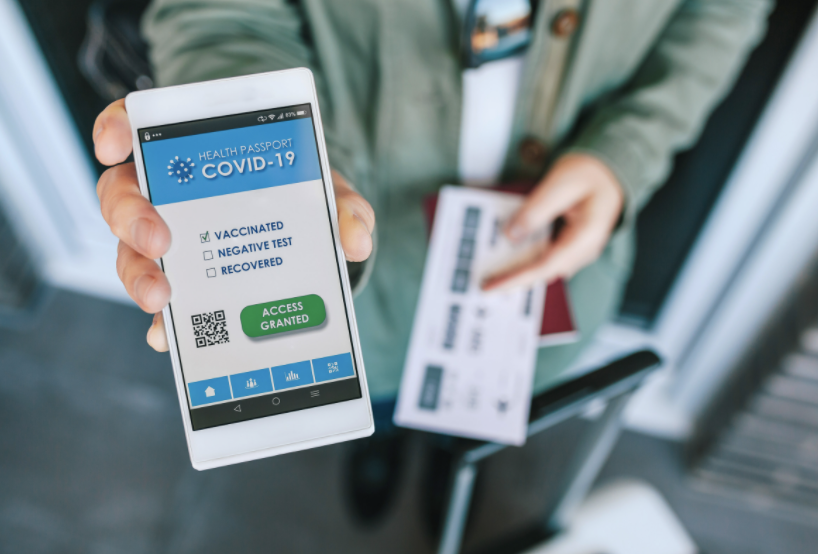As the pandemic gets under control and the world begins to resume normal activities, the question many have is, how do we move on? What will travel, for business or pleasure, look like in the future? Well, recent events in the EU may shed some light. The EU voted on June 9th to approve the Digital COVID Certificate. Nine of the twenty-seven member countries have already begun using it, but it officially launches on July 1st.
What Is The EU Covid Certificate?
The EU Digital COVID Certificate is a QR code, either in paper or digital media, that contains a digital signature. Each issuing institution (e.g. a health department, hospital, etc.) has its own digital signature that is verified when the QR code is scanned.
The code signifies whether the individual has been vaccinated and which vaccine was used, whether they have received a recent negative test, and if they have been infected and recovered from the virus.
It is up to each country to give out the certificates (some referring to them as vaccine passports) and they are to be free for their residents. Citizens will be able to request these certificates from the national authority in their county. Some may also be able to access it through their health portal online.
The European Commission helped the EU with the digital infrastructure for this project. The Commission built a digital "gateway" that enables those who scan the QR code to verify that it is legitimate, properly issued by an authorized agency, and not fraudulent. The commission also helped member states create apps and software to properly roll out this program.
What Information Is Included In The Certificate?
The EU Digital COVID Certificate will hold necessary personal information about the holder. The information will include their name, DOB, the date of issuance, their testing/vaccine/recovery information, a unique identifier, and the digital signature of the issuing authority.
This data is not collected or stored by anyone that scans the QR code. The information about the individual is simply read to verify their vaccination/testing status. No other personal health information is accessible.
How Will It Help
All twenty-seven members of the EU have agreed to accept this certificate as a measure to ease travel restrictions. Europe, like most of the world, imposed travel restrictions and mandates last year in an attempt to slow the spread of the virus. The EU member states have agreed to ease these restrictions.
Certificate holders should be exempted from travel restrictions when traveling within the EU. The member states will allow travelers free movement, unless there is some concern. At that point, there may be travel restrictions that "are necessary and proportionate to safeguard public health."
In other words, certificate holders in the EU should face little to no restrictions when traveling to any of the member states.
What About Those Not Vaccinated?
For those who are weary about the vaccines, there is good news. The certificate's purpose is to facilitate unrestricted travel within the EU. The certificate will notate if the individual received a vaccine, or if they recently tested negative for the virus, or if they had the virus and recovered.
Those who are not vaccinated will be able to travel to other EU countries with ease, if their certificate shows that they had a recent negative test. Until now, if one wanted to travel by train from Spain to Croatia, one would have undergone numerous COVID-19 tests at each border to ensure the individual did not have the virus.
Now, as long as people test negative for COVID-19 and their certificate lists the negative test, they have around 72 hours to travel without having to be subjected to other tests.
For those that are vaccinated, it is important to note that not all vaccines are accepted. The European Commission has approved four vaccines, Janssen Pharmaceutica NV, AstraZeneca, BioNTech and Pfizer, and Moderna.
Countries Using A COVID Certificate/Passport
The system went live on June 1st as nine member states began testing the system. Bulgaria, Croatia, Czech Republic, Denmark, Greece, Germany, Lithuania, Spain, and Poland are trying out this new system ahead of the hard launch date of July 1st.
The UK, who is no longer part of the EU, is creating its own certificate with the hopes of it being compatible with the systems of other countries.
Japan announced its plan to issue certification of COVID-19 vaccination as well. Paper certificates will be given to those who are fully vaccinated, with a digital version available later this year.
Will America Be Next?
The question that lingers is, will America follow suit? An Ipsos study from April 2021 surveyed 28 countries on their opinion of a COVID-19 Vaccine Passport. Their definition of a passport is "a record or health data certificate that would prove whether an individual has been vaccinated against COVID-19 or has recently tested negative for COVID-19."
78% of respondents stated that travelers entering their country should be required to have a vaccine passport.
67% agree that a passport should be required to enter large venues such as stadiums and concerts.
55% believe that one should be required to enter public places such as restaurants, shops, and offices.
A recent GALLUP poll shows that 57% of American adults were in favor of proof of vaccination before air travel. There is a difference between the GALLUP poll and the Ipsos study. The GALLUP poll asked if people should be vaccinated to travel, while the Ipsos study also includes negative tests for COVID-19.
New York recently launched its Excelsior Pass, that provides proof of vaccination, and it is already required to attend concerts and sporting events. Like the EU's COVID Certificate, it is a QR code that shows the holder's vaccination status.
Many prominent conservatives have expressed concern over the idea of requiring a passport in the United States. Many Republican governors have signed executive orders banning vaccine passports.
Verification vs Passport
There is some indication that the term "passport' is a hindrance, a recent study by the de Beaumont Foundation and Dr. Frank Luntz found. The results illustrate that the term vaccine "verification" was much preferred to the term "passport."
“But the concept of a ‘vaccine passport’ pushes nearly every partisan political button for Republicans who already don’t trust their political leaders and fear government overreach.” - Dr. Luntz
The poll also indicated that 60% were in support of creating a voluntary document for vaccination verification. Perhaps Americans will be more receptive to a COVID-19 passport/verification if it included negative tests as well, and not just proof of vaccination.
With the States being torn on the issue, the Biden Administration strongly stated that it is not going to pass a federal mandate on vaccination documentation. Press Secretary Jen Psaki commented during a briefing that, "The government is not now, nor will we be supporting a system that requires Americans to carry a credential."
Conclusion
Countries around the world are establishing systems to offer verification of vaccination. Nine European nations already have a system in place, the UK and Japan have plans for a certificate for their citizens, and polls highlight the interest worldwide. In America hesitancy towards a COVID-19 passport remains high, but increasing acceptance may be as easy as changing the name from passport to verification.

